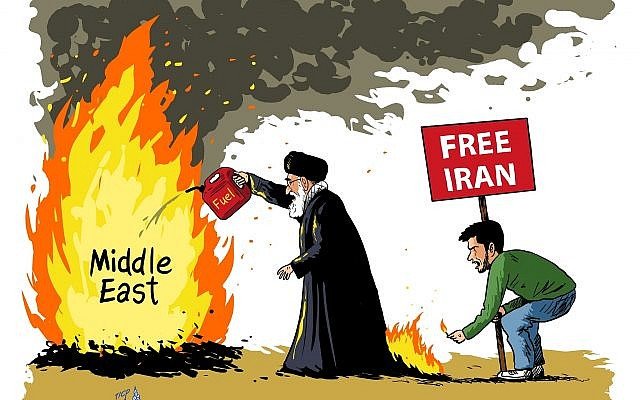Iran, the Competing Power Centers and Middle Eastern Imbroglios
Charles Elias Chartouni/April 30/2021
شارل الياس شرتوني: تنافس مراكز القوى في إيران ووضع الشرق الأوسط المعقد
The released tapes of the oral history project unveils the rifts amongst the Iranian regime power centers and brokers, the competing political visions and strategies, and their incidence on regional and international policy making. Foreign minister Jawad Zarif statement reveals the internal cracks of the Iranian regime, the dwindling influence of Ali Khamenei, and the overriding hold of the Revolutionary Guards. He dwelt extensively on the role of Qassem Suleimani who worked diligently on sabotaging the nuclear accord of 2015, and expanding the scope of the Iranian destabilization strategy throughout the Middle East, jointly with Russia and the satellite movements he created in Lebanon, Syria and Iraq. The aim of the sabotaging strategy was to forestall the normalization of the Iranian status within the international community, usher the second wave of Iranian imperialism inaugurated by the nascent Islamic revolution, undermine the likelihood of a moderate version of the ongoing regime, and thwart the dynamics of liberalization in the Iranian civil society which already lives in a post-Islamic era.
J.Zarif highlights the pervasiveness of these cleavages and their relationship with the prevailing revolutionary power structure, its embryonic contradictions, unending power struggles and inwardness, since they all revolve around the regime’s survival. The cynical and subversive nature of the Iranian regime far from being incidental, temporary and tendentially accommodating, reflects its totalitarian propensities, the foreclosures and vested interests of the power elites who controlled it from the very beginning. Power turfs and struggles are systemic features that are hardly reformable and unlikely to yield an alternative political culture, unless the regime implodes and gives way to contending views and power elites. The statement of minister J. Zarif caused a major uproar within the ruling revolutionary guard and was tantamount to Suleimani’s assassination, since it displayed the glaring divisions and their incidence on the regime’s future, and ability to project itself as a cohesive actor in the nuclear negotiations. How can Iran engage the US and the international community while unable to mend its internal rifts, feature a united stand on regional issues, and muster support within its national community.
The discrepancies highlighted by Foreign minister Zarif validate the conventional perception of the Iranian regime’s reluctance to normalize, abide by the rules of international civility, and engage consensual conflict resolution regionally and internationally. This disclosure far from being accidental, brings out the serious differences among the dominating oligarchs, the depth of cultural wars within Iran, and the inability to deal with the international community on the very basis of an undercut consensus, deception, active insurgencies, militarization scenarios and low intensity conflicts. This open divergence aired right before presidential election (June 18th, 2021) is inevitably impacting its outcome, the future of negotiations, and enlightening insofar the prospects of normalization of the Iranian regime.
The pessimistic views of minister Zarif are quite inauspicious, and sound a dire warning on the whereabouts of a regime whose survival is the only stake that matters. The death of Suleimani was a timely admonition which recalls the need to sway a malevolent totalitarian dictatorship, checkmate its sabotaging politics, sustain Iranian internal liberalization, and force a comprehensive diplomacy.
The negotiation script should preempt the segmented approach, based on the separation between the nuclear dossier and the disruptions of Iranian power politics throughout the Middle East, and dissipate the whims of an international counter-order adumbrated by Khomeiny and recapitulated by Ahmadi-Nejad and Suleimani. The subtexts of negotiations being as relevant and decisive as their unfolding and awaited outcomes.























